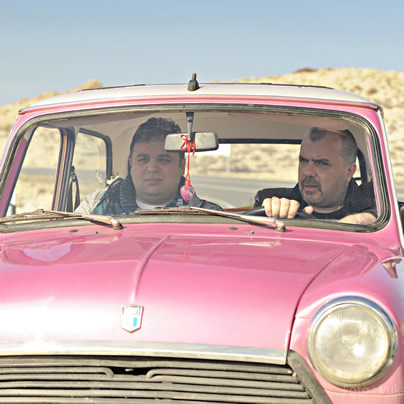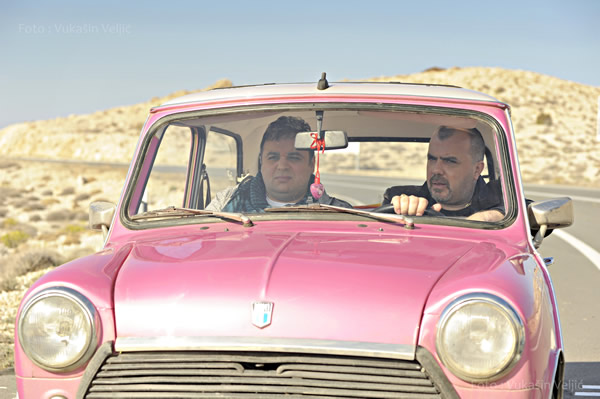Arts & Entertainment
Calendar through April 18
A thought provoking play about Prop 8, film festivals, parties and more all week


Gay-themed movie ‘The Parade,’ screens at Filmfest D.C. on Friday. The movie follows a gay rights organizer as he links up with a prejudiced former soldier that he hires for security (Photo courtesy of Global Film Initiative).
Friday, April 12
Equality UUCF presents a one-night only staged reading of “8,” a play about California’s Proposition 8, tonight at 8 p.m. at the Unitarian Universalist Congregation of Fairfax (2709 Hunter Mill Rd., Oakton, Va.). Written by Academy Award-winning screenwriter Dustin Lance Black, who is responsible for “Milk” and “J. Edgar,” chronicles the landmark trial of Perry v. Schwarzenegger. The play pulls on actual court transcripts and first-hand interviews. Tickets are $10. Visit uucf.org for more information.
A trailer for the star-studded Hollywood reading of 8:
Special Agent Galactica returns with her happy hour show at the Black Fox Lounge (1723 Connecticut Ave., NW) with LaTiDo alum pianist Zack Ford, Heather Nadolny, Christopher Harris, Alan Gendreau and Elizabeth Hallacy this evening at 6 p.m. Music includes pieces by Pat Benatar, Judy Garland, Stevie Nicks, Nancy Sinatra and Ray Stevens. Admission is free. For more information, visit pinkhairedone.com.
Filmfest D.C. continues tonight with the screening of the “The Parade” at the Avalon Theatre (5612 Connecticut Ave., NW) at 9:15 p.m. The film follows a gay-rights march organizer and the prejudiced former soldier that he hires to provide security for one the events. The film recently won the Panorama Audience Award at the Berlin International Film Festival. Tickets for this individual screening is $12. Attendees of the festival can buy individual tickets at each location’s box office, or they can purchase the Director’s Package, which is 10 tickets for $95, or the Weekday Package, which is four tickets for $39. For show times, locations and more information about the films, visit filmfestdc.org.
A trailer for The Parade:
Sugarloaf Crafts Festival returns to the Montgomery County Fairgrounds (16 Chestnut St., Gathersburg) today at 10 a.m. The festival features artists from around the country with their most recent works. It also offers seasonal and gourmet foods, including candies, chocolates, soups, artisan breads, jams, dips, syrups and olive oils. The celebration lasts until Sunday evening. Admission is $8 online and $10 at the door, and is good for all three days of the festival. For more information, visit sugarloafcrafts.com.
POZ hosts its invasion meet and greet at the Green Lantern (1335 Green Court NW) tonight at 7 p.m. POZ is an event for men who are HIV positive and for those who without hang ups on dating someone with HIV. There will be drink specials all night. Visit greenlanterndc.com or visit the POZ’s Facebook event for more information.
Phase 1 (1415 22nd St., NW) hosts the opening party for Fuego, featuring DJ Flowers from “RuPaul Drag Race” tonight at 9 p.m. Cover is $15. For details, visit phase1dupont.com.
Saturday, April 13
The Junior League of Northern Virginia hosts its eighth annual Strides for Success 5K Race and 1K Family Fun Run/Walk today at 8:30 a.m. at the Fairfax Corner Shopping Center (11950 Grand Commons Ave., Fairfax, Va.). The proceeds will benefit the organization’s mission to fight obesity in kids and promote healthy eating habits. The run is $30 for adults and $20 for children under age 10. The walk is $15 per person. Visit jlnv.org for details.
Town (2009 8th St., NW) hosts the eclectic dance party “Mixtape” with DJs Shea Van Horn and Matt Bailer tonight at 10:30 p.m. Cover is $8 before 11 p.m. and $12 after. For details, visit towndc.com.
Burgundy Crescent volunteers this morning at Food and Friends (219 Riggs Rd., NE) at 8 a.m. Volunteers will help with food preparation and packing groceries. The shifts are limited to 10 per shift. For more information, visit burgundycrescent.org.
Sunday, April 14
Drag Salute to the Divas presents a drag performance of “The Color Purple Twisted,” a lip-synched play at the Howard Theatre (620 T Street, NW) at 8 p.m. Doors open at 6. The show is described as an “inspiring family saga that tells the unforgettable story of a women who, through love, finds the strength to triumph over adversity.” Tickets are $20 in advance or $25 at the door. Visit thehowardtheatre.com for details.
The Arlington Philharmonic presents a free performance at the Washington-Lee Auditorium (1301 N. Stafford St.) this afternoon at 3 p.m. The performance will feature the “Overture to Iphigeneia” in Aulis by Wagner, Beethoven’s Piano Concerto No.2 in B-flat Major and the Brahms Symphony No.3 in F Major. For more information, visit arlingtonphilharmonic.org.
Lambda Sci-Fi meets today at 1:30 p.m. at 1425 S St., NW for its monthly social meeting. Attendees are asked to bring snacks or drinks. For more information, visit lambdascifi.org.
Monday, April 15
The D.C. Chapter of the National Lesbian Gay Journalists Association and the Human Rights Campaign host a post-argument discussion about the two gay marriage cases recently in front of the U.S. Supreme Court tonight at 8 p.m. at the Human Rights Campaign, Equality Forum (1640 Rhode Island Ave., NW). Veteran attorneys with years of Supreme Court experience Walter Dellinger and Paul M. Smith will offer their insights while Jonathan Capehart of The Washington Post and MSNBC will moderate.
The D.C. Center (1318 U St., NW) holds coffee drop-in for the senior LGBT community today from 10 a.m.-noon. The Center will provide complimentary coffee and a community to chat with. For more information, visit thedccenter.org.
Bears do Yoga takes place this evening 6:30 p.m. as part of a series at the Green Lantern (1335 Green Court, NW). This is part of a basic yoga series that takes place every Monday and is open to people of varying body types and experience. There is no charge. For more information, visit thedccenter.org.
Tuesday, April 16
Green Lantern (1335 Green Court, N.W.) hosts its Safer Sex Kit-packing program tonight from 7-10:30. The packing program is looking for more volunteers to help produce the kits because they say they are barely keeping up with demand. Admission is free and volunteers can just show up. For more information, visit thedccenter.org.
Wednesday, April 17
Bookmen D.C., a men’s gay-literature group, meets tonight at 7:30 p.m. to discuss “The Lost Library: Gay Fiction Rediscovered” at the American Foreign Service Association (2101 E St., NW). All are welcome. For more information, visit bookmendc.blogspot.com.
The Tom Davoren Social Bridge Club meets tonight for social bridge at 7:30 p.m. at the Dignity Center (721 8th St., SE). No partner is needed. Visit lambdabridge.com, for more information.
Whitman-Walker Health (1701 14th St., NW) holds its HIV+ Newly Diagnosed Support Group tonight at 7. It is a confidential support group for anyone recently diagnosed with HIV and the group welcomes all genders and sexual orientations. Registration is required and attendees must call 202-797-3580 or email [email protected]. For details, visit whitman-walker.org.
Thursday, April 18
Whitman-Walker Health presents the annual Partner for Life to U.S. Sen. Tammy Baldwin at its annual spring event “Be the Care” this evening at 6:30 p.m. at the National Museum of Women in the Arts (1250 New York Ave., NW). The event marks the organization’s 20th year and raises fund for the large range of health care services provided. Tickets are $150. For details, visit whitman-walker.org.

Team DC, the umbrella organization for LGBTQ-friendly sports teams and leagues in the D.C. area, held its annual Night of Champions Awards Gala on Saturday, April 20 at the Hilton National Mall. The organization gave out scholarships to area LGBTQ student athletes as well as awards to the Different Drummers, Kelly Laczko of Duplex Diner, Stacy Smith of the Edmund Burke School, Bryan Frank of Triout, JC Adams of DCG Basketball and the DC Gay Flag Football League.
(Washington Blade photos by Michael Key)




















The 2024 National Cannabis Festival was held at the Fields at RFK Stadium on April 19-20.
(Washington Blade photos by Michael Key)
















Covering the @NatlCannaFest at RFK Stadium for @WashBlade . Stop by the LGBTQ+ booth and pick up a paper if you are here. pic.twitter.com/is7hnsaPns
— Michael Patrick Key (@MichaelKeyWB) April 20, 2024
Theater
‘Amm(i)gone’ explores family, queerness, and faith
A ‘fully autobiographical’ work from out artist Adil Mansoor

‘Amm(i)gone’
Thorough May 12
Woolly Mammoth Theatre
641 D St., N.W.
$60-$70
Woollymammoth.net
“Fully and utterly autobiographical.” That’s how Adil Mansoor describes “Amm(i)gone,” his one-man work currently playing at Woolly Mammoth Theatre.
Both created and performed by out artist Mansoor, it’s his story about inviting his Pakistani mother to translate Sophocles’s Greek tragedy “Antigone” into Urdu. Throughout the journey, there’s an exploration of family, queerness, and faith,as well as references to teachings from the Quran, and audio conversations with his Muslim mother.
Mansoor, 38, grew up in the suburbs of Chicago and is now based in Pittsburgh where he’s a busy theater maker. He’s also the founding member of Pittsburgh’s Hatch Arts Collective and the former artistic director of Dreams of Hope, an LGBTQ youth arts organization.
WASHINGTON BLADE: What spurred you to create “Amm(i)gone”?
ADIL MANSOOR: I was reading a translation of “Antigone” a few years back and found myself emotionally overwhelmed. A Theban princess buries her brother knowing it will cost her, her own life. It’s about a person for whom all aspirations are in the afterlife. And what does that do to the living when all of your hopes and dreams have to be reserved for the afterlife?
I found grant funding to pay my mom to do the translation. I wanted to engage in learning. I wanted to share theater but especially this ancient tragedy. My mother appreciated the characters were struggling between loving one another and their beliefs.
BLADE: Are you more director than actor?
MANSOOR: I’m primarily a director with an MFA in directing from Carnegie Mellon. I wrote, directed, and performed in this show, and had been working on it for four years. I’ve done different versions including Zoom. Woolly’s is a new production with the same team who’ve been involved since the beginning.
I love solo performance. I’ve produced and now teach solo performance and believe in its power. And I definitely lean toward “performance” and I haven’t “acted” since I was in college. I feel good on stage. I was a tour guide and do a lot of public speaking. I enjoy the attention.
BLADE: Describe your mom.
MANSOOR: My mom is a wonderfully devout Muslim, single mother, social worker who discovered my queerness on Google. And she prays for me.
She and I are similar, the way we look at things, the way we laugh. But different too. And those are among the questions I ask in this show. Our relationship is both beautiful and complicated.
BLADE: So, you weren’t exactly hiding your sexuality?
MANSOOR: In my mid-20s, I took time to talk with friends about our being queer with relation to our careers. My sexuality is essential to the work. As the artistic director at Dreams of Hope, part of the work was to model what it means to be public. If I’m in a room with queer and trans teenagers, part of what I’m doing is modeling queer adulthood. The way they see me in the world is part of what I’m putting out there. And I want that to be expansive and full.
So much of my work involves fundraising and being a face in schools. Being out is about making safe space for queer young folks.
BLADE: Have you encountered much Islamophobia?
MANSOOR: When 9/11 happened, I was a sophomore in high school, so yes. I faced a lot then and now. I’ve been egged on the street in the last four months. I see it in the classroom. It shows up in all sorts of ways.
BLADE: What prompted you to lead your creative life in Pittsburgh?
MANSOOR: I’ve been here for 14 years. I breathe with ease in Pittsburgh. The hills and the valleys and the rust of the city do something to me. It’s beautiful, it’ affordable, and there is support for local artists. There’s a lot of opportunity.
Still, the plan was to move to New York in September of 2020 but that was cancelled. Then the pandemic showed me that I could live in Pittsburgh and still have a nationally viable career.
BLADE: What are you trying to achieve with “Amm(i)gone”?
MANSOOR: What I’m sharing in the show is so very specific but I hear people from other backgrounds say I totally see my mom in that. My partner is Catholic and we share so much in relation to this.
I hope the work is embracing the fullness of queerness and how means so many things. And I hope the show makes audiences want to call their parents or squeeze their partners.
-

 South America3 days ago
South America3 days agoDaniel Zamudio murderer’s parole request denied
-

 Maryland4 days ago
Maryland4 days agoMontgomery County police chief discusses arrest of trans student charged with planned school shooting
-

 Politics5 days ago
Politics5 days agoCourt records raise concerns about right-wing TikTok investor’s influence
-

 Commentary4 days ago
Commentary4 days agoWorld ‘isn’t much different today’











